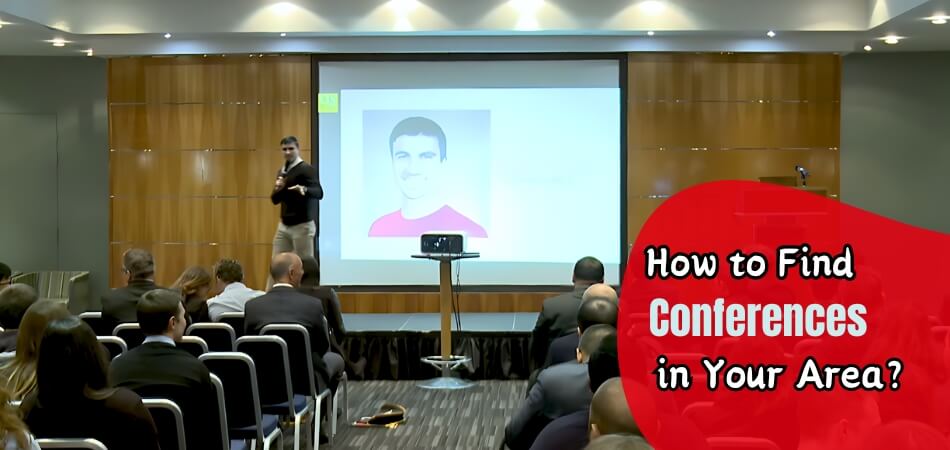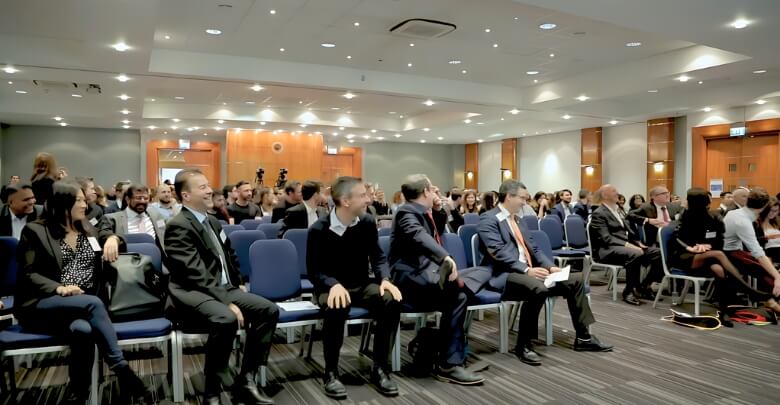Finding the right conferences to attend can be an invaluable experience for your professional growth. It offers valuable networking opportunities and the latest industry insights. Now, you might be thinking about: How to find conferences in your area?
You can locate conferences in your area by using conference organizer websites, staying updated on industry journals and social media, seeking peer recommendations, monitoring university event listings, and aligning conference dates with your research or professional schedule while setting clear participation goals.
Clear participation objectives can further improve your conference experience. Follow along as we explore deeper into these strategies, helping you pinpoint the perfect conferences near you.
What You Need to Know About the Conference?
When preparing to attend a conference, there are several key aspects you should consider to make the most out of the experience. In that case, knowing the conference agenda and identifying sessions that align with your research interests or professional goals is crucial. This ensures you engage with relevant content and experts in your field.
Additionally, familiarize yourself with the speakers and their backgrounds. With this information at your fingertips, you may modify your queries and conversations, which could result in more fruitful discussions and networking opportunities.
Consider logistics such as travel arrangements, accommodations, and local amenities when finding conferences to attend. Being well-prepared logistically allows you to focus more on the content of the conference and less on last-minute hurdles.
Actively participate in discussions and networking sessions. Engagement is key to unlocking the full potential of any conference, providing you with access to new ideas, collaborations, and future opportunities.
How to Find Conferences in Your Area?
Finding conferences in your area can significantly increase your professional development and networking opportunities. Knowing where to look and how to stay informed is essential for maximizing these benefits. Here’s a step-by-step guide to help you locate the best conferences nearby.
Method 1: Use Conference Organizer Websites
Browse websites of reputable conference organizers to find upcoming events. These platforms often provide detailed information about dates, locations, and topics. Regularly check for updates to stay informed about new conferences. Set alerts to never miss an announcement.
Method 2: Stay Updated on Industry Journals and Social Media
Industry journals and social media platforms are excellent resources for finding conferences. Follow relevant hashtags and accounts to get real-time updates. Join professional groups and forums where conference announcements are frequently shared. Engage with posts to stay connected.
Method 3: Seek Peer Recommendations
Ask colleagues and peers for conference recommendations. They can provide firsthand insights and experiences about events worth attending. Personal recommendations often highlight valuable, lesser-known conferences. Network with peers to discover opportunities that might not be widely advertised.
Method 4: Monitor University Event Listings
Universities frequently host and list academic conferences on their websites. Regularly check these listings for events related to your field. you can find a list of conferences there, and choose one that suits your needs.
Method 5: Align Conference Dates with Your Schedule
Select conferences that fit your research or professional timeline. Ensuring dates align with your availability maximizes your participation benefits. Avoid scheduling conflicts to fully engage with the conference activities. Setting clear participation goals helps in choosing the right events.
How Can You Find a Conference in Your Area?
Setting goals for attending a conference ensures you gain the most from the experience. By defining your objectives, you can align them with the right events. Here’s what to consider when setting your goals for finding a conference in your area.
Define Your Objectives
Identify what you want to achieve by attending a conference. Are you looking to network, learn new skills, or present your research? Clear objectives will guide your choice of events. Make your goals to the specific opportunities each conference offers.
Align Goals with Conference Focus
Choose conferences that align with your objectives for a more rewarding experience. If your goal is to present research, look for conferences that offer opportunities for effective PowerPoint presentations. This will allow you to share your findings in a structured and impactful manner. For networking, seek out events that feature ample networking sessions, facilitating connections with industry peers and potential collaborators. By aligning your goals with the features of the conference, you ensure that your participation is both strategic and beneficial.
Consider the Conference Schedule
Review the conference schedule in detail. Ensure the sessions align with your goals and interests. Look for opportunities to attend workshops or special sessions. A well-matched schedule maximizes the benefits of your participation.
Assess Learning Opportunities
Assess the learning opportunities each conference provides. Look for sessions, workshops, or seminars relevant to your field. Check the credentials of speakers and presenters. Quality learning opportunities contribute significantly to your professional development.
Set Realistic Participation Goals
Set realistic and achievable participation goals for the conference. Plan how many sessions or networking events you can attend. Don’t overcommit; ensure you have time to engage fully. Realistic goals help you stay focused and gain the most from the event.
Distinct Benefits of Attending the Conference
Your professional growth can be enhanced by attending a conference. It opens doors to new opportunities and learning experiences, allowing you to stay updated on the latest trends in your field. Additionally, conferences provide a unique platform for networking with industry leaders and peers, creating valuable connections. Here’s how attending conferences can benefit you.
Networking Opportunities
Conferences bring together professionals from various fields. Meeting new people can lead to valuable connections and collaborations. Engaging in conversations can provide fresh insights and ideas. Building a network can significantly improve your career prospects.
Knowledge Expansion
Speakers at conferences are often experts in their fields. Listening to their insights can expand your knowledge and understanding. You’ll learn about the latest trends and developments. This newfound knowledge can be applied to your work, improving your skills.
Professional Development
Attending workshops and sessions can enhance your professional skills. You can learn new techniques and methodologies. These skills can make you more efficient and effective in your job. Professional development is key to career advancement.
Inspiration and Motivation
Hearing success stories can be incredibly inspiring. They can reignite your passion for your work. Motivational speakers often provide tips on overcoming challenges. This inspiration can help you stay motivated and focused on your goals.
Exposure to Innovation
Conferences often showcase the latest innovations in the industry. You’ll get to see new technologies and solutions firsthand. This exposure can spark new ideas for your projects. Staying updated with innovation is crucial for staying competitive.
Career Opportunities
Conferences can open doors to new job opportunities. Many companies attend these events to scout for talent. You can also learn about potential career paths and roles. This can guide your career decisions and help you achieve your goals.
Personal Growth
Attending conferences can also contribute to personal growth. You’ll gain confidence by interacting with different people. Learning new things can make you more adaptable. Personal growth can positively impact both your professional and personal life.
Some Tips for Maximizing Conference Experience
Attending a conference is a valuable opportunity for growth and networking. Making the most of this experience requires some planning and strategy. Here are some tips to help you maximize your conference experience.
Plan Ahead
Research the conference schedule before attending. Identify key sessions and speakers you want to see. Plan your day to avoid missing important events. Setting priorities helps manage your time efficiently and explore different ways to find out about conferences.
Engage Actively
Participate in discussions and ask questions during sessions. Engaging with speakers and attendees can increase your learning experience. Take notes to remember key points and ideas. Active participation makes the conference more rewarding.
Network Strategically
Make a list of people you want to meet. Approach them during breaks or networking events. Exchange contact information and follow up after the conference. Building meaningful connections can be beneficial for your career.
Stay Open-Minded
Be open to new ideas and perspectives. Listen to different viewpoints and think about how they apply to your work. Attending diverse sessions can broaden your understanding. An open mind leads to a richer conference experience.
Follow Up
After the conference, reach out to new contacts. Send a thank-you email or connect on social media. Review your notes and implement what you’ve learned. Following up ensures you retain the benefits of the conference.
Frequently Asked Questions
Taking advantage of conferences in your area can significantly increase your networking and professional development. Here are some frequently asked questions and their answers to guide you in locating the best conferences nearby.
What Role Do Industry Journals Play in Finding Conferences?
Industry journals often publish information about upcoming conferences relevant to your field. Subscribing to these journals keeps you updated on important events. They are a reliable source for finding industry-specific conferences.
What Is the Importance of Aligning Conference Dates with My Schedule?
Choosing conferences that fit your professional timeline ensures maximum participation benefits. Aligning dates with your availability helps you engage fully in conference activities. Avoiding scheduling conflicts allows you to make the most of the experience.
How Can I Set Clear Participation Goals for Conferences?
Setting clear goals helps you focus on what you want to achieve at a conference. Whether it’s networking, learning new skills, or presenting research, defined objectives guide your participation. Clear goals increase your overall conference experience.
How Can I Stay Open-Minded During a Conference?
Staying open-minded allows you to embrace new ideas and perspectives. Listening to different viewpoints can broaden your understanding and spark innovative thoughts. An open mind leads to a richer and more rewarding conference experience.
Why Is Planning Important for Conference Attendance?
Planning ensures you don’t miss important sessions or networking opportunities. Reviewing the conference schedule helps you prioritize key events. Effective planning improves your overall conference experience, making it more productive and enjoyable.
Bottom Lines
There are numerous benefits to attending conferences, including networking and expanding knowledge. Planning and strategic engagement can help you make the most of these opportunities. Attending conferences requires preparation and active participation to maximize the benefits.
Knowing how to find conferences in your area is related to exploring organizer websites, staying updated on industry journals and social media, seeking peer recommendations, monitoring university event listings, and aligning conference dates with your schedule. Each method offers unique benefits and keeps you informed about the best events.
An effective conference experience requires clear objectives, effective preparation, and active engagement. Remember, the connections you make and the knowledge you gain can significantly impact your career growth. Following these strategies will ensure you find and benefit from the best conferences in your area.








